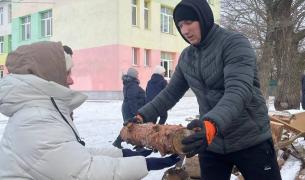Preparing students for the world of work and leadership development

One of my key priorities as a teacher was to ensure my students were equipped with the relevant skills, values, and attitudes to prepare them for the evolving world of work. To do this and supplement the academic knowledge students receive inside the classroom, I wanted to expose my students to different types of learning experiences through project-based learning focused on helping them acquire communication, listening, innovation, and problem-solving skills.
These projects are learner-centered and are done in groups. Each group has a team leader who is responsible for mobilizing their fellow students to ensure the project moves forward until its completion. Some examples of these projects include: recycling old clothes to make flower vessels, recycling plastic bottles to make seats within the school, setting up a vegetable garden where the vegetables were planted in recycled plastic bags and tins, making tiered gardens from plastic bottles, making liquid soap, amongst others.

Project-based learning has helped my students develop 21st-century skills that are essential in preparing them for careers and developing them as leaders. Amongst these skills is self-direction—my students have the self-drive to accomplish their project tasks in time and are always motivated to bring materials they can use for their projects to school, such as plastic bottles, bags, tins etc. Additionally, these projects have taught students to be problem solvers at school and in their communities. For example, students always found it inconvenient and tiresome that every time someone wanted to sit outside the classroom, they had to move their seat outside. The students solved this problem by constructing permanent sitting places outside classrooms with plastic bottles. I’ve also seen how students have become creative and innovative through the different designs they came up with during the project of recycling old clothes to make flower vessels—a sign that they’re developing as creatives and risk takers. The projects have also increased teamwork and collaboration among the students through spending time working in groups.
These projects have also been supported by local non-governmental organizations who helped us scale them. One example is Nsamizi, an NGO that visited our school and was so impressed by our demonstration garden project that they donated vegetable seedlings in order to scale the garden. Equal Acqua Uganda, another NGO, was inspired by our project of constructing permanent sitting places from plastic bottles and promised to donate a 10,000-liter water tank to the school. In projects that involve recycling, parents have been our biggest support system as they give their children materials that we request, like plastic bottles, old plastic bags, and tins. Some parents who are part of the Parents Teachers Association come to school and also take part when we are carrying out projects, and we have the support of Youth Initiative For Development in Africa, the founder and owner of the school.
I have learned a lot of lessons from developing and implementing these projects, key amongst which are the importance of persistence and patience. There were a lot of challenges I encountered while carrying out some of these projects but I have learned to continue carrying on. Another lesson I have learned from developing these projects is continuous learning. When I come up with a project, I always share the ideas with my colleagues, and, together as a team, we share knowledge, skills, and expertise in implementing the project until it is perfectly executed.


